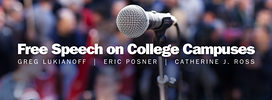Kruth says Lukianoff cited two surveys; Ross says FIRE doesn’t need a survey. But the surveys Kruth cites are irrelevant because they do not ask the relevant question. I can’t tell whether Ross opposes a survey because she thinks the truth is obvious or because she thinks there is no way to know the truth. I differ on both.
Ross says the issue is not the “First Amendment” but “First Amendment values.” She has to: if all she cared about is the First Amendment, then she couldn’t object to speech codes in private universities because private universities’ speech codes are protected by the First Amendment. So she says she means values. But if private university speech codes are protected by the First Amendment, then why aren’t private university speech codes also protected by First Amendment values? Clearly they are—and for the reason I discussed in my first post (one of only two arguments I made, and it still has not received a response):
We allow liberal newspapers and conservative newspapers rather than requiring all newspapers to publish diverse political views because we think that restrictions of speech within institutions may promote freedom of speech across institutions. The logic applies to universities, whose leaders should be allowed to experiment in the same way.
I want to offer a hypothetical for the group. A conservative student writes an article in the student newspaper opposing affirmative action, or condemning Islam, or denying the existence of a “rape culture,” or praising Donald Trump, or what have you. He is the only conservative who writes for the newspaper and one of the few (perhaps the only) outspoken conservative students on campus. A group of left-wing students, under cloak of anonymity, distribute vicious leaflets that call him various and sundry names. Their goal, likely to be successful because of students’ sensitivities to one another’s good opinion, is to shut down the expression of conservative opinion on campus. Question: should the university try to identify the authors of the leaflets and discipline them for violating a speech code that forbids “harassment”?
I say yes, for this reason, so ably articulated elsewhere:
Attempts to shield students from words, ideas, and people that might cause them emotional discomfort are bad for the students. They are bad for the workplace, which will be mired in unending litigation if student expectations of safety are carried forward. And they are bad for American democracy, which is already paralyzed by worsening partisanship. When the ideas, values, and speech of the other side are seen not just as wrong but as willfully aggressive toward innocent victims, it is hard to imagine the kind of mutual respect, negotiation, and compromise that are needed to make politics a positive-sum game.
Kruth, Ross, and Lukianoff are right to worry about campus speech but underestimate the complexities that universities face even if we ignore their many other responsibilities (above all, ensuring that students actually learn something in their studies, a responsibility that seems to have been lost in the debates over campus speech), and assume all they were supposed to do is advance “First Amendment values.”

